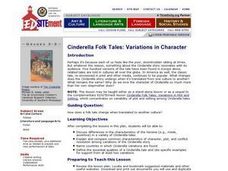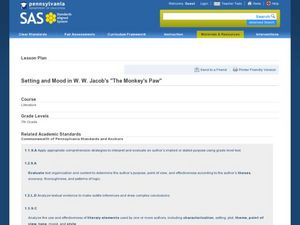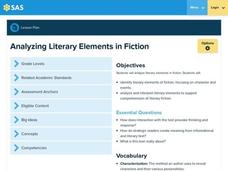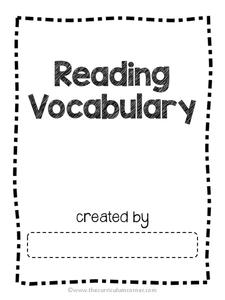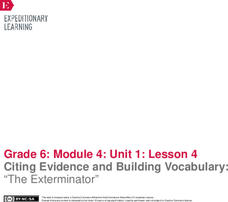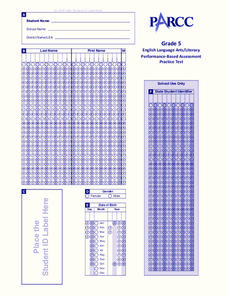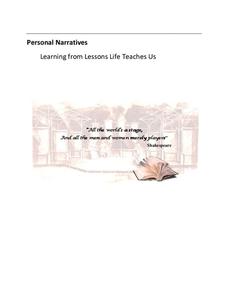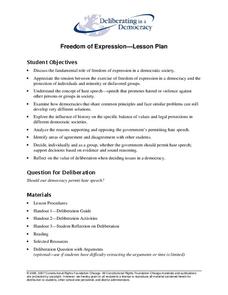Curated OER
Cinderella Folk Tales: Variations in Character
Students read a variety of Cinderella tales from different cultures. They discuss the differences in character, plot, and conflict resolution in the stories from different countries.
Google
Beginner 4: Searching for Evidence for Research Tasks
Having a strong searching skill set can make a research project much easier and much for successful for pupils. Tackle finding evidence with the ideas included here. The ultimate goal is for class members to learn the stepping stones...
K12 Reader
Finding Text Evidence: Frederick Douglass
After reading a very brief excerpt from Frederick Douglass' autobiography, learners cite textual evidence to support a main idea of the primary source about Douglass' humiliating experience with slavery. This is a brief exercise that...
English Linx
Textual Evidence Worksheet
Perfect for a unit on characterization and simple enough to use with any text. Your class will practice the Common Core standard of citing textual evidence to support their analysis by first making an assertion about a character from a...
National Endowment for the Humanities
In Emily Dickinson's Own Words: Letters and Poems
Analyze the depth and beauty of American Literature by reading Emily Dickinson's letters and poems. The class analyzes Dickinson's poetic style and discusses Thomas Wentworth Higginson's editorial relationship with Dickinson. They pay...
Curated OER
The Importance Setting and Mood in Fiction
Seventh graders examine the setting in pieces of fiction. In this story analysis lesson, 7th graders investigate the setting in fictional stories and the importance it has. Students discover new vocabulary terms applying to storytelling.
Pennsylvania Department of Education
Analyzing Literary Elements in Fiction
Students analyze the characters and events in fictional writing. In this literary elements lesson, students study the meaning of the words characterization and fiction. They listen to the story Pigsty by Mark Teague, or any other book...
Curated OER
Summarizing Key Information
Imagine the surprise when small groups present their Evidence Charts to the class and discover that each group has studied a different version of the Cinderella story. Irish, Ojibwa, Egyptian, Chinese, Korean, Persian, Mexican, and...
Curated OER
Role-Playing and Discovery: Literary Analysis
Introduce your class to the personal essay with this worksheet. Learners identify the subject of an essay and then record examples from the essay that represent the author's thoughts and feelings regarding the subject. While this...
Walters Art Museum
The Symbolism of Allegorical Art
Introduce learners to allegorical art with four bronze sculptures by Francesco Bertos. After modeling how to recognize bias and allegory in Bertos' Africa, class groups examine the other three sculptures in the series before creating...
Curriculum Corner
Academic Reading Vocabulary
From A to Z, learners define, draw, and find examples of specific reading focus skills in an alphabetized reading vocabulary packet. Words include dialogue, theme, text structure, genre, paraphrase, and many more.
EngageNY
Citing Evidence and Building Vocabulary: “The Exterminator”
It is an out-of-body experience. Scholars take a look at the sidebars outside the body of the text in The Exterminator. They discuss the purpose of this type of text feature and work to determine the gist. Learners write unfamiliar...
Curated OER
Performance-Based Assessment Practice Test (Grade 5 ELA/Literacy)
Check in on the development of your fifth graders' reading and writing skills with this Common Core-designed assessment. Given a series of six reading passages ranging from narrative stories to informational texts, young learners answer...
Baruch College Writing Center
Summarizing, Paraphrasing, and Quoting Workshop
What's the difference between summarizing and paraphrasing? Show class members how to find the main ideas from informational text and condense it, restate it, or quote it directly with a series of educational activities based on two...
New York State Education Department
TASC Transition Curriculum: Workshop 10
How have educational standards evolved? Educators of adults examine expectations in the 10th workshop out of 15 to better determine how standards have grown. Participants respond to a variety of sample questions to determine how they...
K12 Reader
Coyote: The Survivor of North America
Coyotes in Chicago? Yip. Middle schoolers demonstrate their ability to identify details that support the idea that coyotes are adaptable creatures.
Southern Nevada Regional Professional Development Program
Common Core Reading Standards: Understanding Argument
What does your class know about logical fallacies? They can find out quite a bit and practice identifying logical fallacies if you follow the steps and use the resources provided here! After reviewing ethos, pathos, and logos, ask small...
New York State Education Department
TASC Transition Curriculum: Workshop 11
You'll C-E-R a difference in classroom achievement after using a helpful lesson. Designed for economics, civics, government, and US history classes, participants practice using the CER model to craft arguments about primary and secondary...
What So Proudly We Hail
Life, Liberty, and the Pursuit of Happiness: A Lesson on the Declaration of Independence
What does it mean to say that a right is unalienable? How did the founding fathers convey this revolutionary concept in the Declaration of Independence? Engage in a close reading and analysis of the Declaration of Independence, and...
Thoughtful Education Press
Personal Narratives: Learning from Lessons Life Teaches Us
"First Appearance," Mark Twain's tale about overcoming stage fright, serves as a model of a personal narrative and gets young writers thinking about milestones in their own lives. After examining student models and considering the...
Deliberating in a Democracy
Freedom of Expression
Should democracies include hate speech as a protected right? Scholars analyze the rights found under the First Amendment to the Constitution through researching evidence. Freedom of expression becomes the focal point of the...
K12 Reader
Extreme Weather
What is thunder? After reading a short article about extreme weather, middle schoolers must use information in the text to explain this weather phenomenon.
Prestwick House
A Long Way Gone
The memoir A Long Way Gone tells the story of a child soldier during the civil war in Sierra Leone. A crossword puzzle helps reinforce key ideas found in the memoir. The puzzle addresses characters, key events, and other details from the...
Southern Nevada Regional Professional Development Program
Close Reading in the Classroom
Close reading is key to the analysis and interpretation of literature. A close reading of the title and the epigraph of “The Love Song of J. Alfred Prufrock” offers readers an opportunity to examine how even single words or names can...


